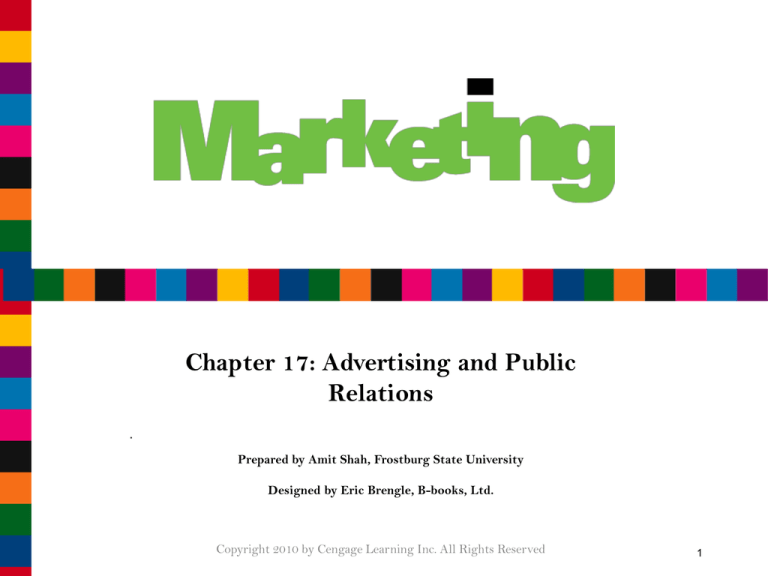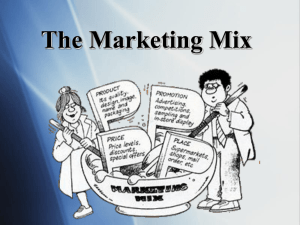
Chapter 17: Advertising and Public
Relations
Prepared by Amit Shah, Frostburg State University
Designed by Eric Brengle, B-books, Ltd.
Copyright 2010 by Cengage Learning Inc. All Rights Reserved
1
Learning Outcomes
LO1
Discuss the effects of advertising on market
share and consumers
LO2
Identify the major types of advertising
LO3
Discuss the creative decisions in developing
an advertising campaign
Copyright 2010 by Cengage Learning Inc. All Rights Reserved
2
Learning Outcomes
LO4
Describe media evaluation and
selection techniques
LO5
Discuss the role of public relations
in the promotional mix
Copyright 2010 by Cengage Learning Inc. All Rights Reserved
3
The Effects of Advertising
LO1
Discuss the effect of
advertising on market share
and consumers.
Copyright 2010 by Cengage Learning Inc. All Rights Reserved
4
The Effects of Advertising
• In recent years, 30 companies spent
over $1 billion each
• The advertising and marketing
services employ approximately
750,000 people.
• Ad budgets of some firms are
almost $4 billion annually.
5
Copyright 2010 by Cengage Learning Inc. All Rights Reserved
The Effects of Advertising
Top Ten Leaders by U.S.
Advertising Spending
Copyright 2010 by Cengage Learning Inc. All Rights Reserved
6
Advertising and Market Share
New brands with a small market share spend
proportionally more for advertising and sales
promotion than those with a large market share
1. Beyond a certain level of spending,
diminishing returns set in.
2. New brands require higher spending to reach
a minimum level of exposure needed to affect
purchase habits.
Copyright 2010 by Cengage Learning Inc. All Rights Reserved
7
The Effects of Advertising
on Consumers
The average U.S. citizen is exposed to
hundreds of ads each day.
Advertising may change a consumer’s negative
attitude toward a product, or reinforce a
positive attitude.
Advertising can affect consumer ranking of a
brand’s attributes.
Copyright 2010 by Cengage Learning Inc. All Rights Reserved
8
LO1
Review Learning Outcome
Effects of Advertising
Copyright 2010 by Cengage Learning Inc. All Rights Reserved
9
Major Types of Advertising
LO2
Identify the major types
of advertising.
Copyright 2010 by Cengage Learning Inc. All Rights Reserved
10
Major Types of Advertising
Institutional Advertising- Enhances
a company’s image rather than
promotes a particular product.
Product Advertising- Touts the
benefits of a specific good or
service.
Copyright 2010 by Cengage Learning Inc. All Rights Reserved
11
Major Types of Advertising
Corporate identity
Institutional
Advertising
Advocacy
advertising
Pioneering
Product
Advertising
Competitive
Comparative
Copyright 2010 by Cengage Learning Inc. All Rights Reserved
12
Product Advertising
Pioneering
Stimulates primary demand for
new product or category
Used in the PLC introductory stage
Competitive
Influences demand for brand in the
growth phase of the PLC
Often uses emotional appeal
Comparative
Compares two or more competing
brands’ product attributes
Used if growth is sluggish, or if
competition is strong
http://www.pizzahut.com
http://www.papajohns.com
Online
Copyright 2010 by Cengage Learning Inc. All Rights Reserved
13
LO2
Review Learning Outcome
The Major Types of Advertising
Copyright 2010 by Cengage Learning Inc. All Rights Reserved
14
Creative Decisions in Advertising
LO3
Discuss the creative
decisions in developing an
advertising campaign.
Copyright 2010 by Cengage Learning Inc. All Rights Reserved
15
Creative Decisions in Advertising
Advertising Campaign - A series
of related advertisements
focusing on a common theme,
slogan, and set of
advertising appeals.
Copyright 2010 by Cengage Learning Inc. All Rights Reserved
16
Creative Decisions in Advertising
Determine the
advertising objectives
Make creative decisions
Make media decisions
Evaluate the campaign
17
Copyright 2010 by Cengage Learning Inc. All Rights Reserved
Setting Objectives:
The DAGMAR Approach
Define target audience
Define desired percentage change
Define the time frame for change
Copyright 2010 by Cengage Learning Inc. All Rights Reserved
18
Creative Decisions
Identify
product benefits
Develop and evaluate
advertising appeals
Execute
the message
Evaluate the
campaign’s effectiveness
19
Copyright 2010 by Cengage Learning Inc. All Rights Reserved
Identify Product Benefits
• “Sell the Sizzle, not the Steak”
• Sell product’s benefits, not its attributes
• A benefit should answer
“What’s in it for me?”
• Ask “So?” to determine
if it is a benefit
Copyright 2010 by Cengage Learning Inc. All Rights Reserved
20
Identify Product Benefits
“SoBe Life Water has reformulated
five delicious, low-calorie flavors,
each infused with essential vitamins
and healthy herbal ingredients.”
Attribute
- So?
Benefit
“SoBe Life Water is not only an
enhanced water; it is a lifestyle unto
itself. It provides consumers the
healthiest, most fun and refreshing
products, delivering the incredibly
positive benefits of hydration.”
Copyright 2010 by Cengage Learning Inc. All Rights Reserved
21
Advertising Appeals
Profit
Product saves, makes, or protects money
Health
Appeals to body-conscious or health seekers
Love or romance
Used in selling cosmetics and perfumes
Fear
Social embarrassment, old age, losing health
Admiration
Reason for use of celebrity spokespeople
Convenience
Used for fast foods and microwave foods
Fun and pleasure
Key to advertising vacations, beer, parks
Vanity and egotism
Environmental
Consciousness
Used for expensive or conspicuous items
Centers around environmental protection
Copyright 2010 by Cengage Learning Inc. All Rights Reserved
22
Unique Selling Proposition
A desirable, exclusive, and
believable advertising appeal
selected as the theme
for a campaign.
Copyright 2010 by Cengage Learning Inc. All Rights Reserved
23
Executing the Message
Scientific
Slice-of-Life
Musical
Lifestyle
Spokesperson/
Testimonial
Demonstration
Mood or
Image
Fantasy
Real/
Animated
Product
Symbols
Humorous
Copyright 2010 by Cengage Learning Inc. All Rights Reserved
24
LO3
Review Learning Outcome
Creative Decisions for Ad Campaign
Set
advertising
objectives
Identify benefits
Develop appeal
Evaluating
results helps
marketers
adjust objectives
for future
campaigns
Execute message
Evaluate
campaign results
Copyright 2010 by Cengage Learning Inc. All Rights Reserved
25
Media Decisions in Advertising
LO4
Describe media evaluation
and
selection techniques.
Copyright 2010 by Cengage Learning Inc. All Rights Reserved
26
Media Decisions in Advertising
Monitored Media
Unmonitored Media
Newspapers
Direct Mail
Magazines
Trade Exhibits
Yellow Pages
Cooperative Advertising
Internet
Brochures
Radio
Coupons
Television
Catalogs
Outdoor Media
Special Events
Copyright 2010 by Cengage Learning Inc. All Rights Reserved
27
Major Advertising Media
Newspapers
Magazines
Radio
Television
Outdoor Media
Yellow Pages
Internet
Copyright 2010 by Cengage Learning Inc. All Rights Reserved
28
Newspapers
Advantages
Geographic selectivity
Short-term advertiser
commitments
News value and
immediacy
Year-round readership
High individual market
coverage
Co-op and local tie-in
availability
Short lead time
Disadvantages
Limited demographic
selectivity
Limited color
Low pass-along rate
May be expensive
Copyright 2010 by Cengage Learning Inc. All Rights Reserved
29
Cooperative Advertising
An arrangement in which the
manufacturer and the retailer
split the costs of advertising
the manufacturer’s brand.
Copyright 2010 by Cengage Learning Inc. All Rights Reserved
30
Magazines
Disadvantages
Advantages
Good reproduction
Demographic selectivity
Regional/local selectivity
Long advertising life
High pass-along rate
Long-term advertiser
commitments
Slow audience build-up
Limited demonstration
capabilities
Lack of urgency
Long lead time
Copyright 2010 by Cengage Learning Inc. All Rights Reserved
31
Radio
Advantages
Disadvantages
Low cost
No visual treatment
Immediacy of message
Short advertising life
Short notice scheduling
No seasonal audience
change
High frequency to
generate comprehension
and retention
Background distractions
Commercial clutter
Highly portable
Short-term advertiser
commitments
Entertainment carryover
Copyright 2010 by Cengage Learning Inc. All Rights Reserved
32
Television
Advantages
Wide, diverse audience
Low cost per thousand
Creative opportunities for
demonstration
Immediacy of messages
Entertainment carryover
Demographic selectivity
with cable
Disadvantages
Short life of message
Consumer skepticism
High campaign cost
Little demographic
selectivity with stations
Long-term advertiser
commitments
Long lead times for
production
Commercial clutter
Copyright 2010 by Cengage Learning Inc. All Rights Reserved
33
TV Advertising: Is Less More?
• The number of ads in TV shows is a
longstanding complaint of viewers and
advertisers.
• Tests are being conducted to feature
shorter commercial pods.
• A significant trend to affect television
advertising is the rise in popularity of
digital video recorders (DVRs) such as
TiVo.
Copyright 2010 by Cengage Learning Inc. All Rights Reserved
34
Outdoor Media
Advantages
Disadvantages
Repetition
Short message
Moderate cost
Lack of demographic
selectivity
Flexibility
High “noise” level
Geographic selectivity
Copyright 2010 by Cengage Learning Inc. All Rights Reserved
35
Internet
Advantages
Disadvantages
Fast growing
Ability to reach narrow
target audience
Difficult to measure ad
effectiveness and ROI
Ad exposure relies on
“click through” from
banner ads
Not all consumers have
access to Internet
Short lead time
Moderate cost
http://www.fox.com
http://www.abc.com
Online
Copyright 2010 by Cengage Learning Inc. All Rights Reserved
36
Videogame Advertising
• In 2006, Microsoft acquired Massive inc.,
a start-up that places ads in video games.
• Ads are inserted into the
game environment.
• Video games could become
a large new medium for
advertising.
SOURCE: Robert A. Guth and Nick Wingfield,
“Microsoft’s ‘Massive’ Move into Game Ads,”
Wall Street Journal, April 26,2006, B1.
Copyright 2010 by Cengage Learning Inc. All Rights Reserved
37
Cell Phones
• Newest advertising media.
• Useful for reaching youth market.
• Over 4 billion cell phone users in the
world.
• In 2008 cell phone ad sales reached over
$1.6 billion in U.S. – nearly $4.4 billion
worldwide.
Copyright 2010 by Cengage Learning Inc. All Rights Reserved
38
Media Selection
• Media Mix – Combination of media to be used for a
promotional campaign
• Cost per contact – The cost of reaching one member of the
target market
• Reach – number of target consumers exposed to a
commercial at least once during a specific period, usually
four weeks
• Frequency – number of times an individual is exposed to a
given message during a specific period
Copyright 2010 by Cengage Learning Inc. All Rights Reserved
39
Qualitative Factors in Media Selection
• Attention to the commercial
and the program
• Involvement
• Program liking
• Lack of distractions
• Other audience behaviors
Copyright 2010 by Cengage Learning Inc. All Rights Reserved
40
Media Scheduling
Continuous
Media Schedule
Advertising is run steadily
throughout the period.
Flighted
Media Schedule
Advertising is run heavily every
other month or every two weeks.
Pulsing
Media Schedule
Advertising combines continuous
scheduling with flighting.
Seasonal
Media Schedule
Advertising is run only when the
product is likely to be used.
Copyright 2010 by Cengage Learning Inc. All Rights Reserved
41
LO4
Review Learning Outcome
Media Evaluation and Selection
Type:
Newspaper
Magazine
Radio
Television
Outdoor
Internet
Alternative
Considerations:
Mix
Cost per contact
Reach
Frequency
Audience selectivity
How much of each?
How much per person?
How many people?
How often?
How targeted is audience?
continuous
Scheduling:
flighted
pulsing
seasonal
Winter
Spring
Summer
Fall
Copyright 2010 by Cengage Learning Inc. All Rights Reserved
42
Public Relations
LO5
Discuss the role of public
relations in the promotional mix.
Copyright 2010 by Cengage Learning Inc. All Rights Reserved
43
Public Relations
The elements in the
promotional mix that:
-evaluate public attitudes,
-identify issues of public concern,
-execute programs to gain
public acceptance.
Copyright 2010 by Cengage Learning Inc. All Rights Reserved
44
Functions of Public Relations
Press relations
Product publicity
Corporate communication
Public affairs
Lobbying
Employee and investor relations
Crisis management
Copyright 2010 by Cengage Learning Inc. All Rights Reserved
45
Public Relations Tools
New product publicity
Product placement
Consumer education
Sponsorship
Web sites
http://www.vw.com
http://www.chevrolet.com
Online
Copyright 2010 by Cengage Learning Inc. All Rights Reserved
46
Example of Consumer Education
• Corporations are teaching public school
students about personal finance.
• People under age 25 are a fast-growing
group for credit card debt increases and
bankruptcy.
• Is it appropriate to use educational materials
with a corporate identity?
• How should financial literacy be taught?
SOURCE: Diya Gullapalli,
“Your Kid’s Teacher: The Bank,”
Wall Street Journal, April 8-9, 2006, B1.
Copyright 2010 by Cengage Learning Inc. All Rights Reserved
47
Managing Unfavorable Publicity
Crisis Management A coordinated effort to handle
the effects of unfavorable
publicity or of an
unfavorable event.
Copyright 2010 by Cengage Learning Inc. All Rights Reserved
48
LO5
Review Learning Outcome
The Role of Public Relations
Copyright 2010 by Cengage Learning Inc. All Rights Reserved
49

